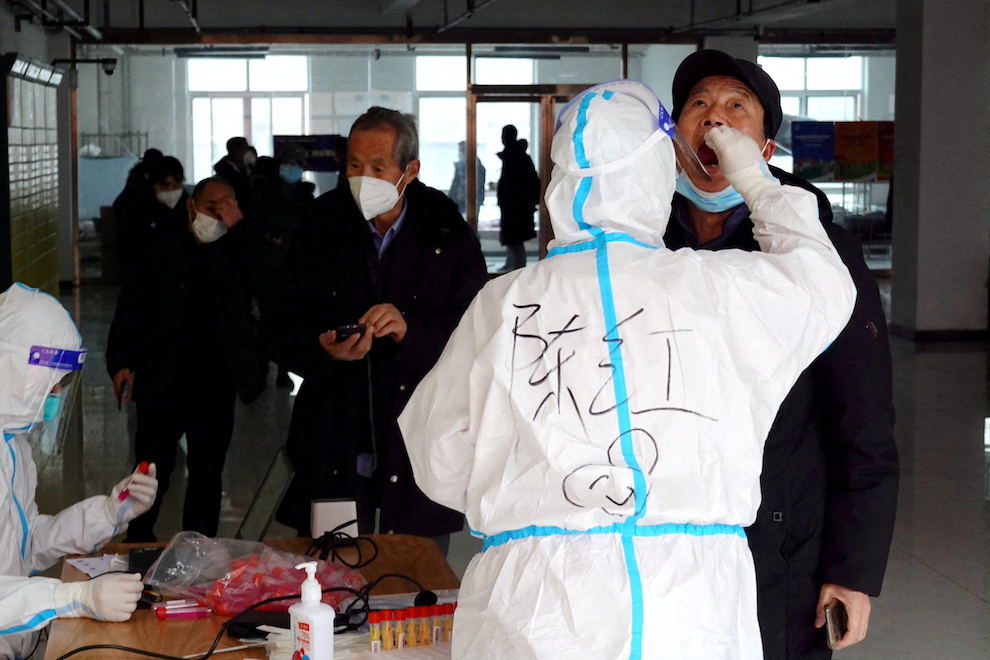China’s ”increasingly burdensome” Zero-Covid policy is the biggest global risk this year and will unsettle markets, potentially worsening supply-chain constraints and inflationary pressures, says research firm Eurasia Group.
Eurasia sees the pandemic ending soon in highly vaccinated rich countries as deaths are prevented in those places, but China will have a hard time getting to the same point, it said in a January 3 note. The prediction is one of the top 10 risks it sees for investment and businesses this year.
“China’s `Zero Covid’ policy, which looked incredibly successful in 2020, is now fighting against a much more transmissible variant with vaccines that are only marginally effective,” said founder and president Ian Bremmer and chairman Cliff Kupchan. “China’s “Zero Covid” policy will fail to contain infections in 2022 and will lead to larger outbreaks and more severe lockdowns, and greater economic disruptions in a nation that has long been the world’s primary engine for growth.”
That means President Xi Jinping’s vision of technological self-sufficiency, economic security and social harmony is poised to collide with intensifying pushback from the West at a time when its growth model is exhausted and its economy is overleveraged and unbalanced, they said.
Public Backlash
Aggressive lockdowns by Xi’s increasingly authoritarian government to halt transmission “will lead to greater public backlash and economic disruption,” they predict.
“China is in the most difficult situation,” they said. “The population has virtually no antibodies against Omicron. Keeping the country locked down for two years has now made it more risky to open it back up. It’s the opposite of where Xi wants his country to be in the run-up to his third term, but there’s nothing he can do about it: The initial success of zero Covid and Xi’s personal attachment to it makes it impossible to change course.
That’s bad news for the world as it means more supply-chain disruptions.
“Shipping constraints, COVID-19 outbreaks, and shortages of staff, raw material, and equipment — all more acute because of China’s zero-Covid policy — will make goods less available,” they wrote. “High prices for shipping will also hurt small- and medium-sized businesses that don’t have the resources to book containers, let alone their own ships. Supply constraints should recede over the course of 2022, but disruptions will persist in many sectors.”
Technopolar World
In Eurasia’s second-ranked global risk for 2022, policymakers in the EU, US, and China will all tighten tech regulations, they say. Tech giants can’t yet (and don’t want to) effectively govern the digital space or the tools they’re creating and so disinformation will further undermine public faith in democracy, particularly in the US, they added.
As tech firms and governments fail to agree on how to protect data privacy, cyber-security, and the safe and ethical use of artificial intelligence, US-China (and, to a lesser degree, US-Europe) tensions on these issues will grow, they say.
‘Too Busy’ For War in Taiwan
Forget the possibility of a war over Taiwan, though because “the US and China are each too busy with challenges at home to wage Cold War 2.0, and the risks of a confrontation over Taiwan are exaggerated,” say Bremmer and Kupchan.
With the US facing difficulties from the coronavirus and severe political division, the odds of the world’s two most powerful nations fighting a war were less, they said, noting that this meant less global leadership and coordination to respond to other challenges such as climate change. And with Xi looking to secure a historic third term at China’s 20th Party Congress this year, Beijing’s energies will be focused firmly on tests at home.
The US and China were likely to underperform, both at home and on the global stage, they said, which meant looming crises in Iran and Ukraine could be more combustible, while humanitarian tragedies in Myanmar, Afghanistan, Haiti, Venezuela and Ethiopia are likely “to continue to fester”.
Covid-19 will continue to drive political and economic instability, they add.
“Developing countries will be hit hardest, and political incumbents will bear the brunt of public anger, while demand for booster shots in wealthier countries will prevent effective vaccines from becoming more widely available,” they said. “New outbreaks will slow economic growth in emerging markets and leave poorer governments with more debt.”
• By Jim Pollard and Kevin Hamlin
ALSO SEE:
China’s Xi’an Locks Down 13m Residents, Warriors Over Covid
China Study Warns of Huge Covid Outbreak If It Opens Up
























